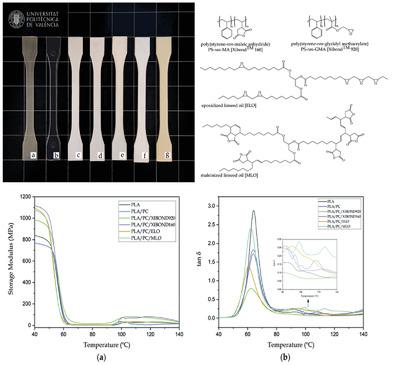当前位置:
X-MOL 学术
›
Macromol. Mater. Eng.
›
论文详情
Our official English website, www.x-mol.net, welcomes your
feedback! (Note: you will need to create a separate account there.)
Improved Toughness of Polylactide by Binary Blends with Polycarbonate with Glycidyl and Maleic Anhydride-Based Compatibilizers
Macromolecular Materials and Engineering ( IF 4.2 ) Pub Date : 2021-08-25 , DOI: 10.1002/mame.202100480 Ramon Tejada‐Oliveros 1 , Jaume Gomez‐Caturla 1 , Lourdes Sanchez‐Nacher 1 , Nestor Montanes 1 , Luis Quiles‐Carrillo 1
Macromolecular Materials and Engineering ( IF 4.2 ) Pub Date : 2021-08-25 , DOI: 10.1002/mame.202100480 Ramon Tejada‐Oliveros 1 , Jaume Gomez‐Caturla 1 , Lourdes Sanchez‐Nacher 1 , Nestor Montanes 1 , Luis Quiles‐Carrillo 1
Affiliation

|
This work reports on the development of polylactide (PLA) and polycarbonate (PC) blends with different compatibilizers with enhanced toughness. Since both polymers are immiscible, two types of compatibilizers are tested: petrochemical-based copolymers Xibond 160 and Xibond 920 with maleic anhydride and epoxy groups, respectively, and natural-based compatibilizers with the same functionalities, namely maleinized linseed oil (MLO) and, epoxidized linseed oil (ELO). Mechanical, thermal, and morphological characterization shows better properties for the PLA/PC (80/20 wt%) blends with chemically modified natural oils (ELO and MLO). The addition of 5 phr (parts per hundred resin) of MLO gives the maximum values for impact strength and elongation at break. Moreover, the glass transition temperature (Tg) slightly decreases with the addition of natural compatibilizers, thus showing some plasticization effect. Petroleum-derived compatibilizers give interesting results regarding tensile strength and stiffness without plasticization. PLA/PC blends show higher thermal stability than neat PLA, regardless of the compatibilizer used, since PC is much more thermally stable than PLA. The obtained results indicate that both petroleum-based and natural-derived compatibilizers positively contribute to enhance the properties of the binary PLA/PC blends. Nevertheless, the results with MLO suggest this is an interesting biobased solution to provide increased toughness to PLA/PC blends.
中文翻译:

通过与基于缩水甘油和马来酸酐的增容剂的聚碳酸酯的二元共混物提高聚丙交酯的韧性
这项工作报告了聚乳酸 (PLA) 和聚碳酸酯 (PC) 与不同增容剂的共混物的开发,以提高韧性。由于两种聚合物不混溶,因此测试了两种类型的增容剂:分别具有马来酸酐和环氧基团的石化共聚物 Xibond 160 和 Xibond 920,以及具有相同功能的天然增容剂,即马来化亚麻籽油 (MLO) 和,环氧化亚麻籽油 (ELO)。机械、热和形态表征表明 PLA/PC (80/20 wt%) 与化学改性天然油(ELO 和 MLO)共混物具有更好的特性。添加 5 phr(每百份树脂的份数)的 MLO 可提供冲击强度和断裂伸长率的最大值。此外,玻璃化转变温度 ( T g)随着天然增容剂的加入而略有下降,从而表现出一定的增塑作用。石油衍生的增容剂在不增塑的情况下,可提供有关拉伸强度和刚度的有趣结果。无论使用何种增容剂,PLA/PC 共混物都显示出比纯 PLA 更高的热稳定性,因为 PC 的热稳定性比 PLA 高得多。获得的结果表明,石油基和天然衍生的增容剂都有助于提高二元 PLA/PC 混合物的性能。尽管如此,MLO 的结果表明这是一种有趣的生物基解决方案,可为 PLA/PC 混合物提供更高的韧性。
更新日期:2021-08-25
中文翻译:

通过与基于缩水甘油和马来酸酐的增容剂的聚碳酸酯的二元共混物提高聚丙交酯的韧性
这项工作报告了聚乳酸 (PLA) 和聚碳酸酯 (PC) 与不同增容剂的共混物的开发,以提高韧性。由于两种聚合物不混溶,因此测试了两种类型的增容剂:分别具有马来酸酐和环氧基团的石化共聚物 Xibond 160 和 Xibond 920,以及具有相同功能的天然增容剂,即马来化亚麻籽油 (MLO) 和,环氧化亚麻籽油 (ELO)。机械、热和形态表征表明 PLA/PC (80/20 wt%) 与化学改性天然油(ELO 和 MLO)共混物具有更好的特性。添加 5 phr(每百份树脂的份数)的 MLO 可提供冲击强度和断裂伸长率的最大值。此外,玻璃化转变温度 ( T g)随着天然增容剂的加入而略有下降,从而表现出一定的增塑作用。石油衍生的增容剂在不增塑的情况下,可提供有关拉伸强度和刚度的有趣结果。无论使用何种增容剂,PLA/PC 共混物都显示出比纯 PLA 更高的热稳定性,因为 PC 的热稳定性比 PLA 高得多。获得的结果表明,石油基和天然衍生的增容剂都有助于提高二元 PLA/PC 混合物的性能。尽管如此,MLO 的结果表明这是一种有趣的生物基解决方案,可为 PLA/PC 混合物提供更高的韧性。







































 京公网安备 11010802027423号
京公网安备 11010802027423号